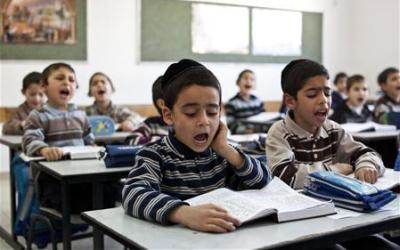Are Jewish schools failing our children?
Quoting a graduating senior, Sam writes, “YHS failed to make religion personal. It seemed like a rulebook, and an unappealing one. Whatever religion I had in me going in vanished through my teenage years.” Another classmate shared, “I feel that I am more knowledgeable, yet far more confused. I think, as of now, I am perfectly unsure of who I am religiously.”
After high school, Sam decided to spend his gap year in Israel, studying at a yeshiva. With two months remaining in the program, Sam dropped out, took off his kippah and began working as an intern for a cause he felt passionate about. Next year, he plans to attend university. Sam’s story breaks my heart, not just because of how the school and yeshiva systems failed him individually, but for all of his friends and for those young Jews they represent.
The widely discussed Pew report of 2013 paints a favorable statistical picture of Jewish identity and continuity for American Jews who identify as Orthodox. However, it is by no means an entirely rosy picture. In an analysis of the Pew data, Rabbi Avraham Edelstein, in Matzav.com, sites the statistic of 330,000 Jews who were raised Orthodox who no longer identify as such. The age group with the highest proportion that left Orthodoxy is Jews aged 65 and older (78 percent). That percentage steadily declines by age group to 17 percent of 18 to 29 year olds who were raised Orthodox but dropped out.
But, does that figure, 17 percent, reflect the true proportion of young Orthodox Jews who are disconnected from their faith? Buried in the Pew survey’s statistics of people who still identify as Orthodox are the ranks of the “Social Orthodox,” as described by Jay Lefkowitz in an article for Commentary. The Judaism of the Social Orthodox is uninspired, based not on belief, but social convention. And in closed ultra-Orthodox communities, in addition to those that actually leave, how many remain behind just going through the motions?
Each situation is individual and family dynamics certainly are crucial, particularly among those chozer b’teshuva. However, to ignore the role our Jewish schools play in influencing our children’s love of and connection to Judaism is to bury our heads in the sand.
I do not profess to have any easy solutions to these problems of alienation, but it seems clear that we need to listen to our children and acknowledge their need for real connection. We need to realize that filling their heads with more halakha (Jewish law) and Talmud, providing simplistic answers to difficult subjects such as homosexuality, slavery, agunot (chained wives) and mamzerim (people born from certain forbidden relationships), among others, is turning them off.
We need to move the discussion from the head to the heart and help our students discover for themselves what our Jewish texts mean personally to them, not just telling them what the commentators have to say. We need to reexamine and redefine the teacher-student relationship based on principles of active listening and safe space.
Perhaps we can start the conversation with a change in terminology and perspective. We refer to one who decides to pursue a religious path as a chozer b’teshuva, which, literally, means “returning with an answer.” A person who leaves a religious life is referred to as a chozer b’sheala, literally “returning with a question.” Acknowledging and validating the questions of our children, which should then be our questions, is the place for us to begin the process of discovery and repair.
Rabbi Yehoshua Looks
Rabbi Yehoshua Looks is COO of Ayeka, a teacher and a freelance consultant to non-profit organizations.

